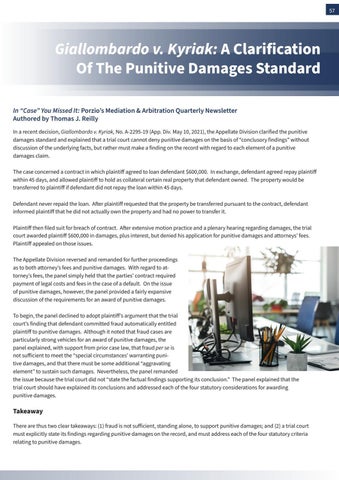57
Giallombardo v. Kyriak: A Clarification Of The Punitive Damages Standard In “Case” You Missed It: Porzio’s Mediation & Arbitration Quarterly Newsletter Authored by Thomas J. Reilly In a recent decision, Giallombardo v. Kyriak, No. A-2295-19 (App. Div. May 10, 2021), the Appellate Division clarified the punitive damages standard and explained that a trial court cannot deny punitive damages on the basis of “conclusory findings” without discussion of the underlying facts, but rather must make a finding on the record with regard to each element of a punitive damages claim. The case concerned a contract in which plaintiff agreed to loan defendant $600,000. In exchange, defendant agreed repay plaintiff within 45 days, and allowed plaintiff to hold as collateral certain real property that defendant owned. The property would be transferred to plaintiff if defendant did not repay the loan within 45 days. Defendant never repaid the loan. After plaintiff requested that the property be transferred pursuant to the contract, defendant informed plaintiff that he did not actually own the property and had no power to transfer it. Plaintiff then filed suit for breach of contract. After extensive motion practice and a plenary hearing regarding damages, the trial court awarded plaintiff $600,000 in damages, plus interest, but denied his application for punitive damages and attorneys’ fees. Plaintiff appealed on those issues. The Appellate Division reversed and remanded for further proceedings as to both attorney’s fees and punitive damages. With regard to attorney’s fees, the panel simply held that the parties’ contract required payment of legal costs and fees in the case of a default. On the issue of punitive damages, however, the panel provided a fairly expansive discussion of the requirements for an award of punitive damages. To begin, the panel declined to adopt plaintiff’s argument that the trial court’s finding that defendant committed fraud automatically entitled plaintiff to punitive damages. Although it noted that fraud cases are particularly strong vehicles for an award of punitive damages, the panel explained, with support from prior case law, that fraud per se is not sufficient to meet the “special circumstances’ warranting punitive damages, and that there must be some additional “aggravating element” to sustain such damages. Nevertheless, the panel remanded the issue because the trial court did not “state the factual findings supporting its conclusion.” The panel explained that the trial court should have explained its conclusions and addressed each of the four statutory considerations for awarding punitive damages.
Takeaway There are thus two clear takeaways: (1) fraud is not sufficient, standing alone, to support punitive damages; and (2) a trial court must explicitly state its findings regarding punitive damages on the record, and must address each of the four statutory criteria relating to punitive damages.



















